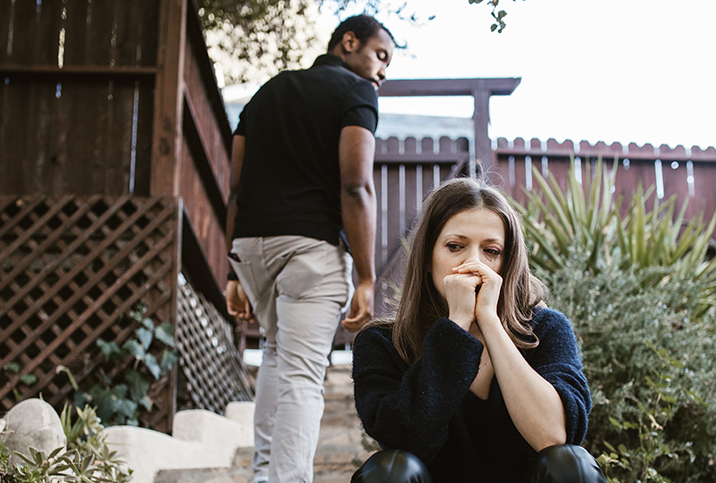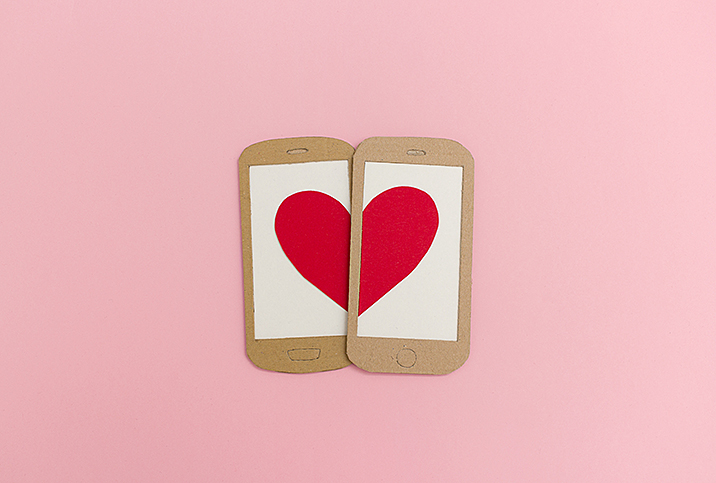Can Jealousy Ever Be a Good Thing in a Relationship?

There's a reason why jealousy is always associated with the phrase "rears its ugly head."
For many people, feeling jealous in a romantic relationship is hardly a good thing. Not only can it cause conflict but for the jealousy-feeler, it can trigger intense emotions, unpleasant physical sensations like a racing heart, and it all contributes to this ominous sense that your relationship could be in harm's way.
And no one likes that.
Jealousy and I have a complicated relationship. When my partner and I discussed opening up our relationship down the line, we both wavered between thinking it would be incredibly hot and feeling jealous at the thought of another person touching our partner.
Sometimes, it turned me on if he got jealous. Other times, I'm wondering why I feel jealous at one moment and not the next. Logically, I align with opening up our relationship but sometimes my insecurities creep in, making me warm with jealousy. Trying to figure out how I really feel is confusing, to say the least.
Jealousy is being human
Thankfully, according to Sarah Kaufman, a psychotherapist at Brooklyn-based Cobb Psychotherapy, feeling confused over my jealousy is pretty common.
"You're feeling a wide range of emotions because you're a human being, and it comes with the territory," she explained. "When thinking about opening up your relationship, it can bring up a whole host of conflicting emotions."
From jealousy to nervousness and excitement and compersion—or earnest empathy and happiness for someone else—jealousy is a complicated emotion. It's also not strictly for romantic relationships either.
"This happens with all kinds of events," Kaufman said. "Think about how you'd feel if your best friend landed the job you applied for and really wanted. On the one hand, you might be happy for and proud of them, and on the other, you might feel disappointed and envious of them for having something you wanted."
Jealousy is not strictly for romantic relationships.
Lindsey McDonald, a 38-year-old in Maryland, remembered a time when her fiance was glued to his phone texting with someone all night long. "He barely paid attention to me," she said. "And when I saw the texts, she totally was flirting with him. I had to say something."
She started feeling angry and scared. Her heart and mind were racing and her hands began to get sweaty. What McDonald was feeling was jealousy. Researchers have found feelings of jealousy to be linked with higher cortisol levels, the stress hormone, that can put you into fight-or-flight mode. As a result, you may feel an elevated heart rate, higher blood pressure and feelings of anxiety.
Fortunately, everything ended up getting resolved. Her fiance, who didn't initially take the conversation as flirting, had a talk with the woman to set some boundaries. Many of us have been in McDonald's shoes at some point or another in our romantic relationships, even if it wasn't caused by that exact situation.
The causes of jealousy
In romantic relationships, jealousy most often comes down to a fear of losing your partner, like you're not good enough to keep them around and not feeling secure in your relationship, according to Tina B. Tessina, Ph.D., a California-based psychotherapist and author of "Money, Sex and Kids: Stop Fighting about the Three Things that Can Ruin Your Relationship."
We feel jealous when that fear is triggered, and those triggers are established when we've been hurt in the past, from our childhood or a previous relationship. Perhaps you witnessed a parent being cheated on and now you have a fear that it'll happen to you, or you may be you have been betrayed by a former partner.
In order to feel secure, you need to trust yourself and your partner.
There are also some people who are more prone to feeling jealous. Another major root of jealousy is a lack of self-esteem or self-trust, commonly found with people who have anxious attachment styles. A 2005 study of adolescents found that jealousy was strongly linked to low self-esteem or loneliness.
"If you don't trust yourself, it's almost impossible to trust someone else," Tessina explained. "If you have low self-esteem, you may doubt your lovability. That makes you hyper-vigilant that you can lose someone at any time because you don't feel you deserve their love. When you're insecure, almost anything can trigger jealousy."
To illustrate that point, I notice that if I'm struck with jealousy at the thought of my partner sexually with someone else, it's often because something made me feel not good enough. When I'm not feeling jealous, it's because I trust in what we have and the strength of our relationship.
Is jealousy ever a good thing?
While some people might think that jealousy means you really care about your partner, Tessina puts a hard stop to that.
"Jealousy is very common in romantic relationships, but that doesn't mean it's healthy," she said. "If you have a real reason to doubt your partner, then you have to look at your own choices. Why love someone you don't trust? Something is wrong when that happens."
But is it really something we can control?
"I think jealousy is normal because it's an automatic response, I don't think anyone thinks to themselves to be jealous, it just happens," McDonald said, adding that jealousy can only end up hurting a relationship if not managed correctly. At the end of the day, jealousy can be corrosive to your connection because it breaks down the trust.
Louisa Reynolds, a 40-year-old in Mexico City, felt like she was being interrogated for a crime she didn't commit when her ex-boyfriend of one year accused her of cheating when a friend sent her a bouquet of flowers for her birthday after she had been away on a business trip.
"The worst part was I started policing my own behavior. 'Is this dress too revealing?' 'Should I ignore a message from a friend in case my boyfriend gets jealous?'" she said. Eventually, his fits of jealousy drove her to end the relationship.
Learning how to manage jealousy
In my case, when I feel jealous during those open relationship discussions, it pulls me out of the moment and into my head with racing, insecure thoughts—a pretty unpleasant reaction. To get over this, Tessina suggested building trust, which happens gradually over time, and learning how to handle jealousy.
She told me that my top priority when it comes to managing our jealousy has to do with myself.
"Develop a solid, trusting relationship with yourself, so you can recognize trustworthiness in others," said Tessina. "The relationship with yourself is the only one you can count on, birth to death." And for me, that means building on my self-confidence and positive affirmations.
When you begin to feel jealous, take a minute and pause before reacting. Tessina suggested some self-reflection, perhaps with the help of a therapist, to identify the root causes of your jealous feelings and triggers.
Clear boundaries can help prevent feelings of jealousy, resentment and betrayal.
But it's also the integrity of both partners to work at the relationship by fostering open communication and support to grow trust. Tessina encourages people to open up to their partner about how they feel and also be receptive to hearing their partner's thoughts and feelings too.
"You can't reach a mutually satisfactory result if you don't tell the truth or listen to your partner," she explained.
Tessina also stresses the importance of being gentle with each other over being angry, punishing or controlling when jealousy does arise. Apologize and reassure each other of your love and faithfulness. The most important thing to remember is that you're on the same team. From there, you can set reasonable boundaries that you're both comfortable with.
Kaufman agreed, especially when it comes to something like opening up a relationship. Clear boundaries can help prevent feelings of jealousy, resentment and betrayal. Additionally, she suggested taking baby steps with low-stakes experiments like watching ethical porn to see your partner get excited by someone else, then checking in on how that made each other feel.
As you work toward your self-esteem and build trust in the relationship, you may feel ready to loosen up the boundaries and give each other more flexibility and freedom—you may even realize that someday you'll feel more compersion than jealousy.


















